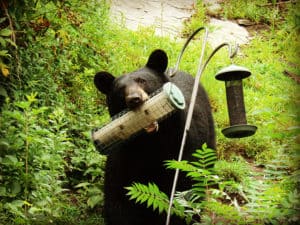The Vermont Fish and Wildlife Department is receiving reports from across the state of black bears seeking food in yards, outbuildings and livestock enclosures this spring, and the department urges Vermonters to take proactive steps for safely coexisting with bears.
“Bears—and people—are at risk when bears spend time in human-dominated landscapes,” said the Vermont Fish and Wildlife Department’s bear project leader Jaclyn Comeau. “Every time a bear finds an easy meal of birdseed, compost or unsecured garbage, they are learning a dangerous association between people and food. Coexisting with bears starts with Vermonters taking proactive steps to help keep bears wild.”

Bird feeders, compost, unsecured garbage, and other food sources left out during the warm months when bears have emerged from their dens are a serious source of risk to bears, encouraging them to spend time in human dominated landscapes.
Today, Vermont is home to a stable bear population estimated at 4,600 to 5,780, almost four times the state’s estimated population of 1,200 to 1,500 bears in 1975. In Vermont, habitat loss, earlier spring weather due to climate change, and increasing development and human encroachment into remote areas can increase the odds of bears crossing paths with people.
In these situations, potential food sources for bears including birdfeeders, compost, or unsecured garbage can encourage bears to spend more time near homes or other development, bringing bears and people into conflict.
Many conflicts between bears and people can be prevented with some easy, proactive steps. The department recommends Vermonters follow these strategies for safely coexisting with Vermont’s healthy black bear population:
- Take down birdfeeders until December. Vermonters can attract birds by planting bird-friendly native plants instead, according to Audubon’s Native Plants for Birds Program.
- Make garbage inaccessible. Store garbage in a secure structure and a bear proof container. The department’s website has instructions for bear-proofing a garbage container.
- Dispose of garbage frequently. Vermonters with pick-up services should wait until the morning of pick-up to put garbage out.
- Demand bear-proof dumpsters for your community.
- Compost responsibly. Follow the steps for composting in bear country on the department’s website. Compost needs to be 3 parts brown materials to 1 part kitchen scraps, turned frequently, and kept in a sturdy tumbler or bin.
- Use electric fencing to keep chickens and bees safe. Fences need to be 4,000-6,000 volts, tested regularly, and baited. The department’s website has guidance for bear-proofing chicken and bee enclosures.
- Clean your grill after every use.
- Make bears feel uncomfortable in your yard. Safe methods are yelling, banging pots and pans, or use other noise devices from inside your house. Never shoot a bear to scare it. Even BBs can seriously injure bears.
Vermont Fish & Wildlife requests that all bear encounters are reported to the dept. Use the black bear incident report tab at vtfishandwildlife.com or contact your local game warden. Doing so helps experts help all Vermonters better coexist with bears.
“Following these steps can save bears’ lives, and help protect you, your neighbors, and your property,” said Comeau, adding that Vermonters can visit the department’s living with black bears web page for more information.
“Please do your part to be a good neighbor and help keep Vermont’s bears wild!” she added.




